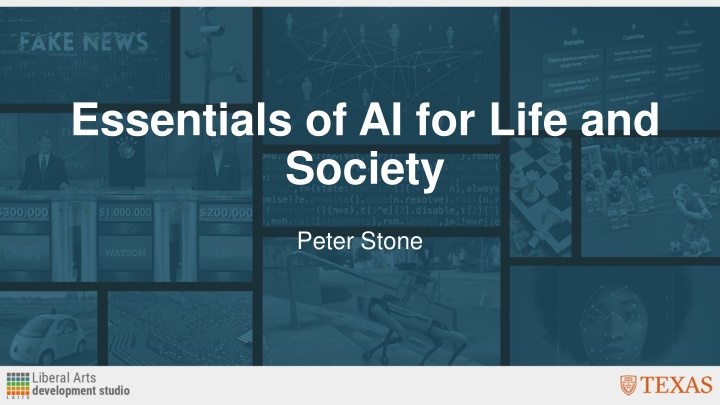
Exploring Artificial Intelligence and Planning in Society
Discover the essentials of artificial intelligence for life and society, delve into planning and search strategies, and understand the implications of defining AI. Explore the context of planning in AI and the balance between feasibility and optimality in algorithmic decision-making.
Download Presentation

Please find below an Image/Link to download the presentation.
The content on the website is provided AS IS for your information and personal use only. It may not be sold, licensed, or shared on other websites without obtaining consent from the author. If you encounter any issues during the download, it is possible that the publisher has removed the file from their server.
You are allowed to download the files provided on this website for personal or commercial use, subject to the condition that they are used lawfully. All files are the property of their respective owners.
The content on the website is provided AS IS for your information and personal use only. It may not be sold, licensed, or shared on other websites without obtaining consent from the author.
E N D
Presentation Transcript
Essentials of AI for Life and Society Peter Stone
Defining Artificial Intelligence A science and a set of computational technologies that are inspired by, but typically operate quite differently from, the ways people use their nervous systems and bodies to sense, learn, reason, and take action NOT one thing More than just deep learning RL, NLP, vision, planning, symbolic reasoning, algorithmic game theory, computational social choice, human computation Getting Computers to do the things they can't do yet Once it works, it's engineering
Some Context Planning is one of the oldest focus areas for AI It is very different from LLMs (ChatGPT) There aren t many (any?) readings aimed at the general public It s OK if you found the discussion of Turing Machines a bit esoteric Computation underlies AI Turing Machines were introduced as a general model of computation when computers didn t have sensors ( classical planning ) But they don t cover all possible situations
Common Questions Are we going to go more in-depth about Turing in this course? I'm curious to learn more about his life and work. Does this area of Planning Algorithms rely on probability formulas/ concepts to arrive at solutions? I wonder how many fields of mathematics are involved in this specific topic? Are there any other books that one can read up on that are outside of this text?
Feasibility vs. Optimality Eesha: It is pretty interesting that feasibility is a priority over optimality. It makes sense in theory as feasibility is a pre-requisite to making something more optimal, but I feel like when it comes to innovation, especially in the classroom, we always approach things based on what is most optimal and efficient. Hannah: I certainly see the benefit of feasible solutions over no solutions at all, especially in instances in which the feasible solution is not far off from the potential optimal solution. However, I wonder if there are cases in which such a defined focus on finding a feasible solution limits the opportunities to discover an optimal solution that would be more efficient.
Self-driving cars Riya: Which kind of motion planning is used in self-driving cars? Could not having spatial awareness be the reason that navigation is a challenge for AI/robotics?
Sealing Cracks in Automotive Assembly What types of AI does the system use aside from trajectory planning? For example, if a car's body is cracked or malformed such that it cannot be sealed, is the robot able to identify this (computer vision) and inform a factory worker? Also, what is the speed at which it is able to perform this task?
Planning for Humanoid Robots Amal: "I think people will be more comfortable around robots if they resemble humans physically, and hopefully eventually mentally as well." Kelly: "I believe that humans will be more uncomfortable with the idea of robots resembling humans physically. It's kind of scary to think that you could be talking to someone, and it turns out they're a robot."
Poll Poll "I think people will be more comfortable "I think people will be more comfortable around robots if they around robots if they resemble humans resemble humans - - Agree Agree - - Disagree Disagree
Planning for Humanoid Robots Amal: "I think people will be more comfortable around robots if they resemble humans physically, and hopefully eventually mentally as well." Kelly: "I believe that humans will be more uncomfortable with the idea of robots resembling humans physically. It's kind of scary to think that you could be talking to someone, and it turns out they're a robot." Discuss!
Poll Poll "I think people will be more comfortable "I think people will be more comfortable around robots if they around robots if they resemble humans resemble humans - - Agree Agree - - Disagree Disagree
Human vs. Machine Planning Kaily: It s interesting to see how humans and machines can both plan in different ways. Humans can act like algorithms by making plans from models, almost like they re doing the planning themselves. I m curious how human plans compare to machine plans, especially more changing situations? Are there times when one is substantially better than the other? Ayush: It really is incredible how difficult it is to get a machine to perform tasks that would be second nature to people. But when we do get the machine to do it, provided the algorithm is as correct as can be, they do it better than us.
Human vs. Machine Planning Namrata: I think it is so interesting how tasks that we see as so easy are pretty complicated for robots as they have to think about all the small minute details like hitting obstacles Hans Moravec wrote in 1988: "it is comparatively easy to make computers exhibit adult level performance on intelligence tests or playing checkers, and difficult or impossible to give them the skills of a one-year-old when it comes to perception and mobility" known as the AI Paradox
Thinking Fast and Slow Nathan: Personally, I use planning and algorithms to do basic everyday tasks that I gradually get better at through repetition, muscle memory, and routines. I think this eventually makes the processes you repeatedly do to be relatively efficient. Daniel: - System 1 is fast, automatic, and intuitive, operating with little to no effort. This mode of thinking allows us to make quick decisions and judgments based on patterns and experiences. - System 2 is slow, deliberate, and conscious, requiring intentional effort. This type of thinking is used for complex problem-solving and analytical tasks where more thought and consideration are necessary. [Planning!] What s a task that can move from System 2 to System 1? What s one that can t? (Or are there none)? Discuss!
Ethics of Algorithmic Planning In response to: "A planning algorithm could even be used to assess whether a sports utility vehicle tumbles sideways when stopping too quickly." on pg. 14 Megha: "How reliable is this algorithm? There is always a chance of wrong predictions or something out of the ordinary that could go wrong and cause a failure in the algorithm. But if the chances of reliability of this planning algorithm is high, this could potentially prevent a lot of driving accidents and wrecks in general." Marcus: "The question is also an ethical one of whether it is better than a human. Although, the answer is simple: if it is, then employ it, and if not, do not." Mohammad: "I agree with the fact that it is also an ethical question. One additional thing to consider is that even if the algorithm is better than a human, how will an accident be received by the public if the algorithm was at fault? People are used to humans making mistakes and singling them out, but in this case it would be interesting to see how things play out." Reflecting on past weeks discussions discuss!
Next Week: Intelligent Robotics Readings: What are robots? Brooks 3 laws of robotics A recent NY Times Article on Killer Robots Lecture by me Ethics module on codes of ethics Clips from Robot and Frank Do readings on perusal and submit ethics reflection! Lucy: This is why robotics is a difficult field to master. The robot's relation to its environment and the sensor inputs that are measured are always changing, which is hard to model without complex calculations. Especially imagining how robotics must respond to unexpected stimuli (i.e. a robot being pushed over by a human and figuring out how to re-orient itself) makes it apparent why planning algorithms are so important for their adaptability.

